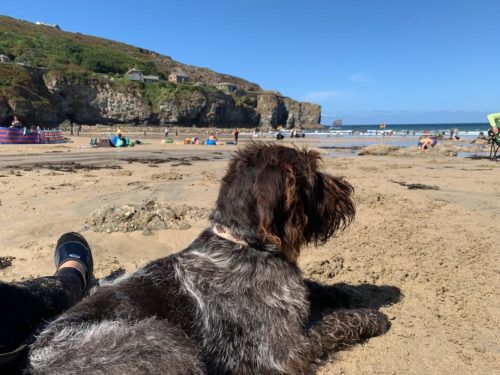
As we enter Summer many of us will be looking forward to taking our dogs on holiday with us. Here are some tips to help you all to enjoy your trip.
Car travel with your dog
- Your dog must be securely restrained in the car e.g., using a seat belt harness, dog cage or dog guard.
- Before a long journey, make sure your dog is happy travelling in a car. Spend time with them in the car while stationary, before making short journeys to fun places to get them used to it in a positive way.
- If your dog continues to find travel stressful, Adaptil transport spray may help.
- Use the air conditioning in warm weather, and never leave your dog in a parked car in warm weather.
- For a long journey, plan safe dog toilet stops and pack a source of water to offer your dog. Make sure they have their collar and tag on, and that their microchip contact details are up to date before you travel.
- Dogs can get motion sickness. Symptoms include drooling, whining and restlessness as well as actual vomiting. Avoid feeding your dog shortly before travelling and speak to us about motion sickness tablets if required.
On holiday
There are lots of dog friendly holiday accommodation options available, just make sure you follow any rules set out by the provider.
At Greenbay Vets we see a lot of holiday makers with their dogs visiting Torbay. Here are some tips we have picked up along the way:
- Make sure you have enough of your pet’s regular medication before you go. Take your dog’s normal food with you or make sure you can purchase it locally; a sudden change of diet can cause a tummy upset.
- Make sure your pet is up to date with flea treatment, you don’t want to pick up any unwelcome guests in your pet-friendly accommodation. Depending on where you are going, tick prevention may also be a consideration.
- Take some of your dog’s familiar things e.g., bed and toys, so they feel ‘at home’.
- Find out the contact details of a local vet, so you have a number to call should you need one. All vets must provide a 24hr emergency service, which may be at their normal site or may be provided by a dedicated night vets somewhere else.
- Check out your new accommodation and local area before letting your dog loose. We have seen dogs injured from falling off balconies, for example. Be aware of any local dog dangers e.g., blue-green algae in lakes or ponds, or adders.
- Make sure your dog has their collar and tag on, and that their microchip contact details are up to date before you travel, just in case they get lost.
- Follow the countryside code – keep your dog on a lead around livestock.
Travelling abroad
If you are planning on travelling abroad with your dog, check out the government pet travel website and speak to us well in advance so you know what you need to do.
